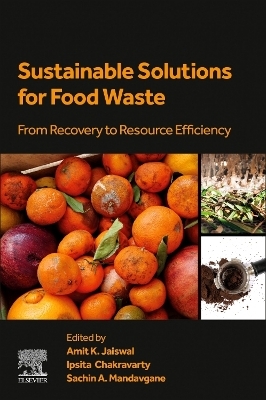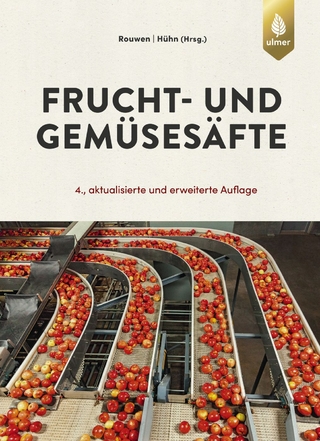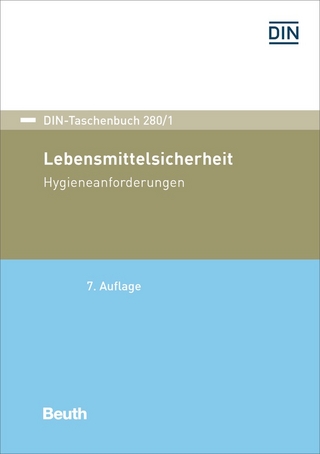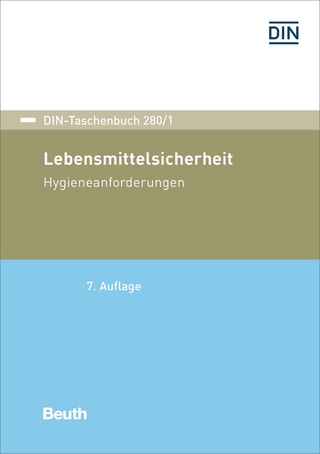
Sustainable Solutions for Food Waste
Academic Press Inc (Verlag)
978-0-443-23959-5 (ISBN)
- Noch nicht erschienen (ca. Juli 2025)
- Versandkostenfrei innerhalb Deutschlands
- Auch auf Rechnung
- Verfügbarkeit in der Filiale vor Ort prüfen
- Artikel merken
Organized into four sections, it comprehensively covers the issue of food waste and sustainability. Section 1 provides an overview of the problem of food waste and the importance of reducing it sustainably, Section 2 focuses on the utilization of waste generated by specific industries, including grape and winery, fruit juice, olive and olive oil, tea and coffee, brewery, dairy, and citrus, Section 3 explores the utilization of waste generated by plant-based industries, including tropical fruit, vegetable, soy, tuberous plant, rice, and hard-shell fruit, and section 4 discusses advanced applications of food waste and resource efficiency.
Dr. Amit K. Jaiswal is a lecturer at Technological University Dublin (TU Dublin)—City Campus, Ireland, where he teaches undergraduate and postgraduate courses in food engineering, food processing technology, and industrial biotechnology in the School of Food Science and Environmental Health. He also serves as the chair of the MSc program in Sustainable Food Safety Management at TU Dublin-City Campus. Dr. Jaiswal earned an MSc degree from Jiwaji University in India in 2005, a PhD in Food Technology from TU Dublin in Ireland in 2012, and an MBA in 2015. His research focuses on valorisation of lignocellulosic biomass into biofuels, biomaterials, and biochemicals through innovative process development and techno-economic analysis. He also studies novel food processing technologies for extracting functional and nutritional ingredients from natural resources and is involved in the development of biodegradable and compostable materials for packaging. Dr. Akdemir Evrendilek is affiliated with Bolu Abant Izzet Baysal University Faculty of Engineering Department of Food Engineering as a full-time professor. She received her BSc degree from Ankara University (Turkey) and MSc and PhD degrees from The Ohio State University (Columbus, Ohio, USA). Her area of expertise includes novel food processing technologies including pulsed electric fields (PEF), high hydrostatic pressure processing (HHP), UV processing, ultrasonication, ozone application and hurdle approaches. Her recent studies include process development, process design and effect of novel processing technologies and food quality, food safety, bio-accessibility and bioavailability of food components and food industry waste valorisation via novel processing technologies. She teaches food processing technologies, novel food processing technologies, food microbiology, instrumental food analyses at undergraduate and graduate levels. She has co-authored more than 60 peer-reviewed scientific papers, book chapters and presentations at national and international conferences and holds several national patents and one EU patent. She is also an editorial member of several scientific journals including Food Engineering Reviews and Journal of Nutrition and Food Sciences.
Section 1: Introduction to Food Waste and Sustainability
1. The Problem of Food Waste: Magnitude, Causes, and Environmental Impacts
2. Sustainable Solutions for Food Waste: An Overview
Section 2: Utilization of Industry-Specific Waste
3. Grape and Winery Industry Waste and Their Utilization
4. Fruit Juice Industry Waste and Their Utilization
5. Olive and Olive Oil Industry Waste and Their Utilization
6. Tea and Coffee Industry Waste and Their Utilization
7. Brewery Waste and Its Utilization
8. Dairy Industry Waste and Its Utilization
9. Citrus Industry Waste and Their Utilization
Section 3: Utilization of Plant-Based Waste
10. Waste Utilization of Tropical Fruits
11. Utilization of Vegetable Waste
12. Soy-Based Wastes and Their Utilization
13. Tuberous Plant (Potato, Onion, Turnip, etc.) Industry Waste and Their Utilization
14. Utilization of Rice Industry Waste
15. Hard-Shell Fruit (Walnut, Pistachio, Peanut, etc.) Waste and Their Utilization
Section 4: Advanced Applications of Food Waste and Resource Efficiency
16. Utilization of Bioactive Compounds (Phenolics, Dietary Fiber, Oligosaccharides, Prebiotics, etc.)
17. Aromatic and Medicinal Plant Utilization Industry, Their Waste, and Valorization
18. Innovative Technologies for Food Waste Recovery and Resource Efficiency
19. Sustainable Business Models for Food Waste Reduction and Resource Efficiency
| Erscheint lt. Verlag | 1.7.2025 |
|---|---|
| Verlagsort | San Diego |
| Sprache | englisch |
| Maße | 152 x 229 mm |
| Themenwelt | Technik ► Lebensmitteltechnologie |
| ISBN-10 | 0-443-23959-2 / 0443239592 |
| ISBN-13 | 978-0-443-23959-5 / 9780443239595 |
| Zustand | Neuware |
| Informationen gemäß Produktsicherheitsverordnung (GPSR) | |
| Haben Sie eine Frage zum Produkt? |
aus dem Bereich


